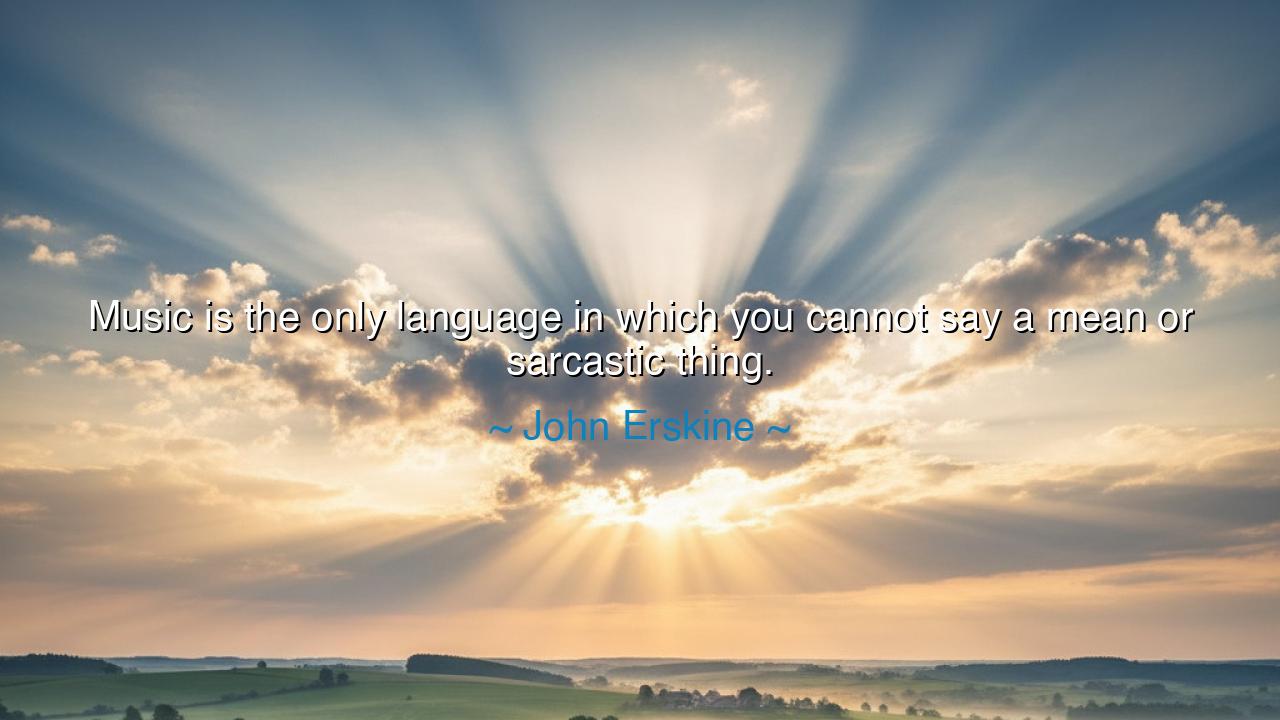
Music is the only language in which you cannot say a mean or






The words of John Erskine — “Music is the only language in which you cannot say a mean or sarcastic thing.” — rise like a hymn of purity in a world often choked with harsh words. For speech can wound, and writings can deceive, but music, in its essence, refuses cruelty. It may be mournful, it may be joyous, it may even thunder with anger — yet never does it stoop to mockery, never does it twist itself into the poisoned arrow of sarcasm. In this, Erskine reveals to us the sacredness of sound: that while tongues may divide, music unites.
The ancients knew this power well. The poets of Greece believed the Muses themselves gave music to humanity so that harmony might soothe discord and bind hearts together. In the courts of kings, where politics often turned cruel, the lyre-player was welcomed not as a schemer but as a healer of spirits. For no melody could be fashioned into ridicule; no true harmony could be bent into meanness. This is the divine nature of music: it cleanses expression of malice, leaving only the raw truth of the heart.
Consider the story of the Christmas Truce in 1914, during the Great War. Men who only hours before had been locked in bloody combat laid down their weapons when carols rose from the trenches. Across the battlefield, Germans and Allies joined in song. Here, music spoke what words could not: not insults, not sarcasm, but the deep truth of shared humanity. In the language of music, there was no room for mockery — only communion.
Even in sorrow, music remains pure. A requiem can be filled with grief, yet it does not strike with cruelty; it consoles even in mourning. A lament may bring tears, but it never sneers. Thus Erskine teaches us that music is the language of the soul uncorrupted. Where human speech can be twisted by pride, envy, or bitterness, music remains incorruptible, a vessel only for sincerity.
This truth is echoed in the life of Beethoven. Though fate struck him with deafness, he did not turn to sarcasm or bitterness in his compositions. Instead, his late works — born of immense suffering — resound with transcendence, hope, and depth. The Ninth Symphony, carrying Schiller’s “Ode to Joy,” bursts not with cruelty, but with the pure cry of universal brotherhood. In the language of music, Beethoven declared unity, not derision.
The lesson, then, is that when words fail — when they stumble into cruelty or mockery — let us turn to music. For it speaks directly to the soul, cutting through anger and malice. If you would heal a rift, sing; if you would lift the weary, play; if you would declare love, let your melody rise higher than words. Where sarcasm seeks to wound, music seeks always to bind and to heal.
Practical wisdom follows: fill your days with songs that uplift, and when your own words threaten to turn sharp, let music take their place. Share a song with your children instead of scolding them with bitterness. Turn to melody when arguments threaten to consume friendship. Remember that in the realm of music, cruelty cannot survive.
Thus, O listener, cherish this eternal truth: music is the language of the heart undefiled. Where all other tongues may falter or be twisted, music alone remains free of venom. Use it well, as balm, as bridge, as light. For in a world too full of sharp tongues and sarcastic arrows, music endures as the one voice that forever speaks only truth and love.






AAdministratorAdministrator
Welcome, honored guests. Please leave a comment, we will respond soon